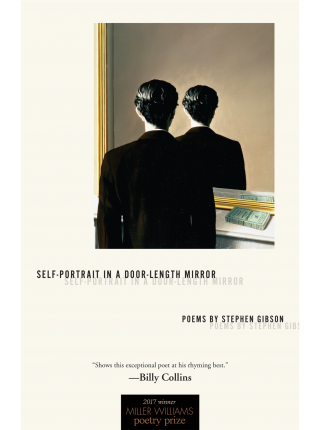Finalist: 2011 Miller Williams Arkansas Poetry Prize
In Paradise, Stephen Gibson’s fourth poetry collection, we are taken on a journey through history and myth, wars past and present, public discoveries and private loss. The search begins and ends with some of the great art and great ruins in cities that once composed part of the Grand Tour of another century. In the collection’s final poem, “Ghosts,” in which an ironical fashion shoot takes Rome’s ruins as its backdrop -“this outcrop of ruin isn’t just urinal, / but also restaurant”-the reader sees the implications and repercussions of such a journey. Meanwhile, in lines set closer to home, early-twentieth-century crime-scene photos from New York City inspire a horrifying sequence of poems where we become part of a perverse Grand Tour in reverse. These images recall the millions of immigrants who came to America’s shores in search of paradise and whose voyages ended with strangulation in tenement basements and rooftop bludgeonings-crimes, the poems suggest, that were perpetrated both by strangers and by acquaintances, spouses, lovers, or friends.
As the reader confronts past horrors and present truths as well as the speaker’s personal ones (an abused mother, a shell-shocked father), it becomes apparent that the paradise sought–not in the hereafter but in the here and now-lies just beyond reach. It all ends, suggest these verses, with the understanding that behind everything we find nothing more divine than the human.
“As he does in Frescoes and Masaccio’s Expulson, Stephen Gibson mines the richest world we know, that of Renaissance giants who gave us so much beauty, so much pain. Like theirs, Gibson’s work is both luscious and rueful, and when I read these poems, each as carefully wrought as a goldsmith’s tray or bracelet, suddenly I feel deeply and happily human.”
—David Kirby, author of The House on Boulevard St.
“Every glimpse of paradise must be paid for by a visit to hell, or that’s what Stephen Gibson seems to be saying in Paradise. St. Catherine and a blonde junkie inhabit the same poem and the same world. A café in Venice cannot help you hide from the grim face of war, the current conflagrations and ones that have left their scars on the past. Italy is where this books starts with its images of the Virgin and the saints, but even in the glories of art there are shots of sex and murder. And this impulse finds its apotheosis in Gibson’s series of ghazals that take an unwavering look at NYC crime scene photos, the paradise of ordinary life cut short by guns or gas or fists. It is this madness that is his real subject. How do we live with the monsters inside us even in this paradise of beauty that is our world?”
—Barbara Hamby, author of Babel and All-Night Lingo Tango
“Paradise is all that it advertises and more. Against a backdrop of urbane Italian tableaux, artistic masterpieces, and crime scene photographs, these narratives are by turns ecstatic, infernal and purgatorial, all in service of a book-length musée de beaux arts that would have dazzled Auden. A master of surprising and unforgettable juxtaposition, Gibson invokes myth, history and the crises of the moment to reveal both ‘the anonymous connection to all damage’ and the necessity of empathy. His combination of poise and urgency is a rare and precious achievement.”
—R. T. Smith, author of Outlaw Style: Poems


